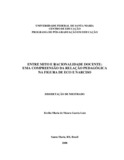| dc.creator | Luiz, Ercília Maria de Moura Garcia | |
| dc.date.accessioned | 2008-07-17 | |
| dc.date.available | 2008-07-17 | |
| dc.date.issued | 2008-04-24 | |
| dc.identifier.citation | LUIZ, Ercília Maria de Moura Garcia. Between myth and teaching rationality: comprehending the pedagogical relation in the figure of Eco and Narcissus. 2008. 81 f. Dissertação (Mestrado em Educação) - Universidade Federal de Santa Maria, Santa Maria, 2008. | por |
| dc.identifier.uri | http://repositorio.ufsm.br/handle/1/6826 | |
| dc.description.abstract | The work Consists of a hermeneutic reflexion on the teaching image before the rationalist world, having as a starting point two critical studies by Theodor W. Adorno:
Taboes that hover over the teaching profession and Philosophy and teachers. In such context, these mainly analyzed rectified phenomena, as well as contemplating an explanation of the subject-object scheme, are focused through the figurehead of professorial language and
language as experience and revelation of world. In this sense, we seek to investigate how the figure of language of Eco and Narcissus can help in the pedagogical professorial understanding. Thus, we consider the systemic reason sprung from illuminism returns to the myth, by validating the tecnical-scientific world and the person s reification; action instrumental despite the professorial communicative action. This other rationality, which we
seek here to approach, activates the premisse that efective comunication within the pedagogical relationship must transcend the metamorphosis of pathological languages such as those of Narcissus and Eco, as well as the overcoming of the same in hermeneutic texture. This way, through comprehension in the pedagogical relationship, involves more than mythical metalanguage, but an opening to comunicative action. If everything is language,
even taboos, when crystalized in this world, dissolve along with the apory of the relationship subject-object. Finaly, in this way, we situate Jürgen Habermas' comunicative reason as another horizon to the pedagogical relation in contemporary times. | eng |
| dc.format | application/pdf | por |
| dc.language | por | por |
| dc.publisher | Universidade Federal de Santa Maria | por |
| dc.rights | Acesso Aberto | por |
| dc.subject | Mito | por |
| dc.subject | Racionalidade docente | por |
| dc.subject | Compreensão | por |
| dc.subject | Linguagem | por |
| dc.subject | Myth | eng |
| dc.subject | Professorial rationality | eng |
| dc.subject | Comprehension | eng |
| dc.subject | Language | eng |
| dc.title | Entre mito e racionalidade docente: uma compreensão da relação pedagógica na figura de Eco e Narciso | por |
| dc.title.alternative | Between myth and teaching rationality: comprehending the pedagogical relation in the figure of Eco and Narcissus | eng |
| dc.type | Dissertação | por |
| dc.description.resumo | O trabalho consiste numa reflexão hermenêutica sobre a imagem docente perante o mundo racionalista, tendo como ponto de partida dois estudos críticos de Theodor W. Adorno:
Tabus que pairam sobre a profissão de ensinar e A filosofia e os professores. Nesse contexto, os fenômenos que se reificaram, prevalentemente analisados, além de contemplarem uma explanação do esquema sujeito-objeto, são enfocados pelo viés da figura da linguagem
docente e da linguagem como experiência e revelação de mundo. Nesse sentido, buscamos investigar o modo de como a figura da linguagem de Eco e Narciso pode auxiliar na
compreensão pedagógica docente. Assim, consideramos que a razão sistêmica decorrente do iluminismo retorna ao mito, ao valorizar o mundo técnico-científico e a coisificação da
pessoa; a ação instrumental em detrimento da ação comunicativa docente. Essa outra racionalidade, que aqui buscamos tematizar, aciona a premissa de que a comunicação efetiva na relação pedagógica deve transcender a metamorfoses de linguagens patológicas tais como as de Narciso e Eco, bem como à superação das mesmas nas tessituras hermenêuticas. Desse modo, pela via da compreensão na relação pedagógica, envolve mais do que metalinguagem mítica, mas uma abertura à ação comunicativa. Se tudo é linguagem, mesmo os tabus,
quando cristalizados nesse mundo, dissolvem-se juntamente com a aporia da relação sujeitoobjeto. Por fim, nessa intencionalidade, situamos a razão comunicativa de Jürgen Habermas como um outro horizonte à relação pedagógica em dias contemporâneos. | por |
| dc.contributor.advisor1 | Trevisan, Amarildo Luiz | |
| dc.contributor.advisor1Lattes | http://lattes.cnpq.br/2534601801498544 | por |
| dc.contributor.referee1 | Dozol, Marlene de Souza | |
| dc.contributor.referee1Lattes | http://lattes.cnpq.br/6380727398982323 | por |
| dc.contributor.referee2 | Cunha, Jorge Luiz da | |
| dc.contributor.referee2Lattes | http://lattes.cnpq.br/7227767555433465 | por |
| dc.creator.Lattes | http://lattes.cnpq.br/3057595087270952 | por |
| dc.publisher.country | BR | por |
| dc.publisher.department | Educação | por |
| dc.publisher.initials | UFSM | por |
| dc.publisher.program | Programa de Pós-Graduação em Educação | por |
| dc.subject.cnpq | CNPQ::CIENCIAS HUMANAS::EDUCACAO | por |


